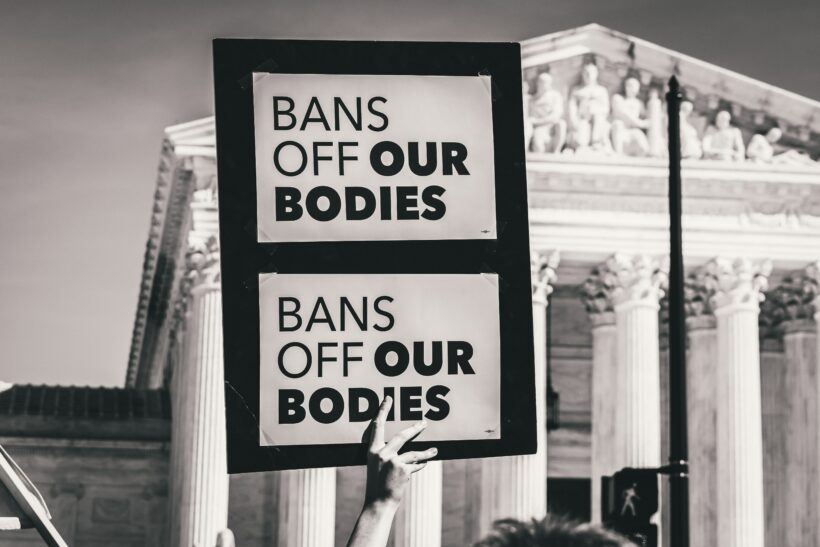Disclaimer: This post reflects solely the opinion of the authors and should not be taken to represent the general views of IPPR’s management/ editorial team or those of fellow authors
The leaked United States Supreme Court draft opinion threatens to assault women’s human right to abortion. It reveals a new approach of the Supreme Court in interpreting the Constitution, setting a dangerous precedent on how the judiciary interprets what rights people – especially women – do and do not have. With the constitutional right to legal abortion likely to be nullified, what is next for the protection of minorities’ rights in America?
Whilst America is still plagued by divisions on the topic of access to abortion, the potential Supreme Court decision to repeal Roe vs. Wade does not side with the majority opinion of the country. 69% of Americans support the legalisation of abortion. Under the constitutionally protected right, set by the landmark court case of Roe vs. Wade in 1973, states are unable to legislate restrictions on abortion. Yet numerous attempts from states such as Mississippi to pass laws on abortion amidst an ongoing anti-abortion agenda from Republicans in Congress has recently brought the case back to the Supreme Court. The proposed decision in the draft opinion means that the current conservative-majority Supreme Court would overrule Roe vs. Wade and allow states to freely ban abortion.
Justice Samuel Alito’s draft opinion claims that “the Constitution makes no reference to abortion, and no such right is implicitly protected by any constitutional provision”. He states further that the reasoning behind Roe was “exceptionally weak” and had “damaging consequences”, arguing that the Court cannot set a nationwide right to abortion based on the constitutional right to privacy. This marks a significant departure from standard judicial practice, as it would overturn over half a century of federal protection of legal abortion. It is expected that 26 states will ban abortion if the decision goes ahead. Already, thirteen states have ‘trigger law’ provisions in place which would immediately ban abortion as soon as Roe vs. Wade is overturned, resulting in 36 million women losing access to safe abortion.
As well as securing a significant milestone in the battle for women’s rights , Roe vs. Wade marked an important change in how the judiciary interprets constitutionally-protected rights. Whilst the Bill of Rights was undeniably groundbreaking, its lack of specificity and clarity has meant that judicial interpretations of the document have differed widely throughout history. Some justices advocate the ‘dead’ interpretive approach, in which the Constitution should protect only what it explicitly states, whilst others have argued it is ‘living’, belonging to the present rather than the Founders who once wrote it. Under the living approach, the unenumerated right to abortion was assumed to be included within the more general right to privacy given by in the Fourteenth Amendment of the Constitution. This interpretation was incredibly important in securing women’s rights to contraception in Griswold vs. Connecticut 1965 and was further legitimised when used again in Roe vs. Wade. A reversal of the ruling would place similar danger on the rights concerning interracial marriage, contraceptive rights and gay marriage vulnerable.
It is undeniable that the Supreme Court has vast and increasing influence over politics in the United States. With Congress defined by partisan polarisation and immobilisation, its lack of success in passing laws makes way for the Supreme Court to become more of a lawmaking body, rather than just “guardians of the Constitution”. After all, greater simplicity is brought to decision-making when it is up to nine Justices, rather than over four hundred House Representatives and one hundred Senators. Although the Supreme Court was not explicitly given this role, precedents set over time have meant that their decisions become ‘common’ law. For example, the process of Judicial Review carried out by the Supreme Court was not set out in the Constitution, but rather became precedent set by the 1803 Marbury vs. Madison case. This allows for the Supreme Court to ensure no laws passed at state or federal level are unconstitutional. Following this, landmark Supreme Court rulings such as the 1954 Brown vs. Board case deemed segregation laws as unconstitutional, positively impacting the progress of the Civil Rights Movement. Whilst these cases demonstrate the benefits of common law, it also poses an inherent danger: a decision can be reversed by the Supreme Court setting a new precedent.
This outsize political influence would not be so concerning if the Supreme Court’s composition were not tied to the Presidency. The President has the power to appoint justices to the Supreme Court, with the consent of Congress. Although this is meant to happen infrequently, Presidents use their appointments to their political advantage, making it so that the Court reflects their party’s ideology. These justices serve for life, meaning that a President can have a lasting impact on the composition of, and in turn the decisions made by, the Court for decades after their time in office. President’s Trump’s appointment of Justice Amy Coney Barrett, which tipped the Supreme Court towards a Conservative-leaning majority, is considered “the quietest and most successful part of his destructive Presidency”.
It is deeply frustrating to have to argue that the rights of women should be protected by law, especially in a country that claims to be built on ideals of equality, democracy and freedom. America’s historical tradition of Lockean ‘inalienable’ rights was enshrined in the Constitution for the first time in any country: rights were seen as naturally belonging to humans and not being given by, or taken away from governments. Yet in practice, this has not happened. The leaked draft opinion demonstrates that women’s rights are not inalienable. In fact, they are rights that can be taken away by a de facto unelected legislature.
The reality is that the Supreme Court is a politicised, decision-making institution, now posing a threat to the very fabric of American democracy. Placing greater emphasis on what the Constitution was, rather than what it means today, is simply nonsensical to the practicalities of modern democracy. Ruth Bader Ginsburg argued that the role of the Supreme Court is not to ignore the changes taking place in society, but to follow and reflect them. If they overturn Roe vs. Wade, the justices of the Supreme Court abandon this historical legacy and pave a way to reopen a dark past for women’s and minorities’ rights.
The urgency for action from the government is unparalleled. President Biden has promised to pass a law codifying the right to abortion. But the true challenge comes with Congress. Congress needs to put aside both its bitter partisan divisions and increasing animosity towards the Supreme Court to remember its most fundamental role: to represent the people of America. Amongst reports that Democrat Senators plan to reveal Republican senators who support overturning Roe vs. Wade, it is time for Congress to stop playing politics and instead act to represent the will of the American people. Abortion should not be another fuel to add to the fire of bipartisan relations, but should mark a unifier in securing the hard-won rights of American women. If Congress fails to act, they have failed America.
By Ruth Lucas,
Ruth is a second year Politics and International Relations student and Deputy Editor of the IPPR. She is interested in Comparative Politics, with a particular interest in European Politics and Populism








